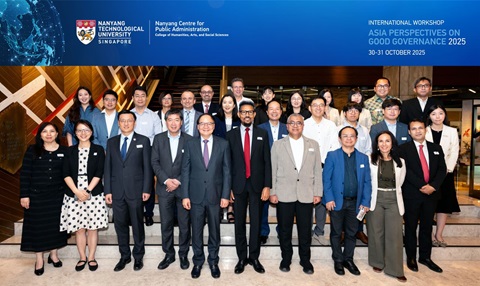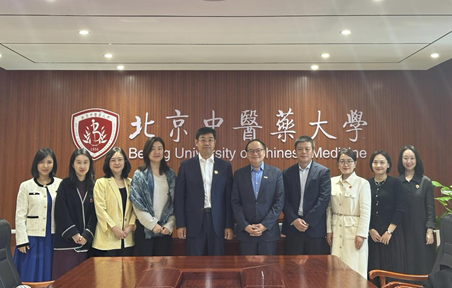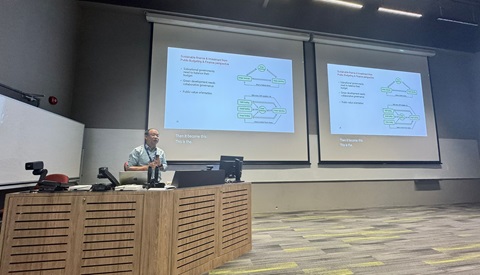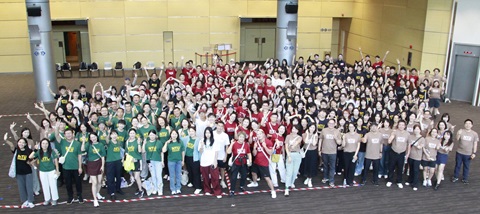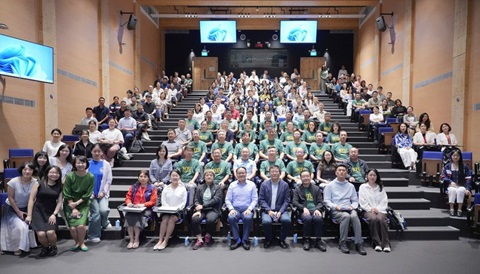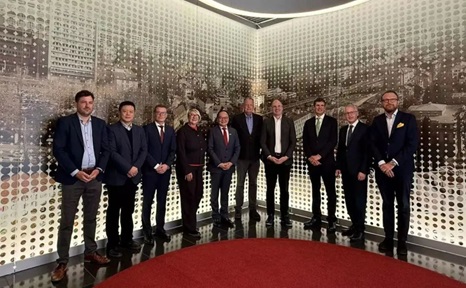On 2 and 3 March 2021, Nanyang Centre for Public Administration (NCPA) at Nanyang Technological University, Singapore (NTU Singapore) organised an international conference on “Transnational Knowledge Transfer and Dynamic Governance: Comparative
Experiences and New Challenges”. The conference included both in-person and online attendance and featured distinguished speakers from Singapore, China, Cambodia, Thailand, the UK, the USA, and Ethiopia. These included Mr Zainul Abidin Rasheed,
former Senior Minister of State for Singapore’s Ministry of Foreign Affairs, NTU Singapore's Board of Trustees Member and NCPA Adjunct Professor; Professor Lam Khin Yong, Senior Vice President (Research), NTU Singapore; Dr Ang Hak Seng, Deputy
Secretary of the Ministry of Culture, Community and Youth and NCPA Adjunct Professor; and Dr Arkebe Oqubay, Senior Minister and Special Adviser to the Prime Minister, Ethiopia. The conference was well received, attracting more than 250 participants
across industries and countries.
-min94c6e590-8927-4173-9066-4dbfc37fb5f3.jpg?Status=Master&sfvrsn=5189839_3) The Conference was held
in person and online
The Conference was held
in person and online
Transnational knowledge transfer is generally regarded as a one-way, "from north to south" knowledge flow. However, in the past few decades, exchanges and interactions between developing countries have become more frequent, which has promoted knowledge
building, skill development, and resource sharing in the political, economic, social, cultural, environmental, and technological fields. Against the backdrop of the COVID-19 pandemic, the public governance and public healthcare systems of countries
worldwide are facing unprecedented challenges. And the tables seem to have turned on countries in the northern hemisphere, such as the United States and European countries, which have not performed satisfactorily in controlling the pandemic. In contrast,
some Asian countries such as Singapore and China have effectively responded to the pandemic, setting an example for developing countries. The practice of mutual learning and policy transfer between the developing and non-Western countries has
become more common, and its influence is also expanding day by day.
In 2017, Professor Liu Hong, Director of NCPA, received a Tier 2 grant from Singapore’s Ministry of Education for the research project titled “Transnational Knowledge Transfer and Dynamic Governance”. In conjunction with the conclusion
of the 3-year project, the NCPA’s research team organised this conference to share their research findings and best practices on public governance and socio-economic development with scholars, policymakers, and practitioners working in the field
of transnational knowledge transfer between countries in the Global South. The conference also discussed new governance challenges brought about by the COVID-19 pandemic and the role played by transnational policy transfer.
-minde8c5c79-f902-43f9-a6e7-5770a7f3dc00.jpg?Status=Master&sfvrsn=af2800a0_3) NCPA Director Prof
Liu Hong delivering his opening speech and sharing the research findings
NCPA Director Prof
Liu Hong delivering his opening speech and sharing the research findings
Prof Liu Hong summarised the main findings of the research project on behalf of the research team. He believed that the process of transnational knowledge transfer is a systematic transfer of software and hardware. The knowledge and experience of one
country cannot be fully applicable to another country. Therefore, in transnational transfer, the localisation of knowledge and experience is a vital link for effective adoption. On the other hand, the institutionalisation of the key process of transnational
knowledge transfer and receiver is also an important aspect of determining its effect.
Using NTU Singapore as an example, Prof Lam Khin Yong gave an introduction on how the University promotes knowledge transfer, innovation and entrepreneurship in the process of research globalisation through reforming scientific research. He believes that
knowledge creation and knowledge transfer are now in an era of collaboration, and research on globalisation can help increase social influence and produce commercial results. Forming a collaborative network is an organic process that requires top-down
leadership and bottom-up support. The success of the triple helix model structure with the elements of universities, industry and government is inseparable from the support and funding of public institutions.
-min357cd1e9-2d62-409f-a167-70ceba8e573e.jpg?Status=Master&sfvrsn=f287b69e_3) Prof Lam Khim Yong,
Senior Vice President (Research), NTU Singapore
Prof Lam Khim Yong,
Senior Vice President (Research), NTU Singapore
-min4f5e20c3-749f-44d0-b4dd-affaa4ada7f4.jpg?Status=Master&sfvrsn=8e685236_3) Mr Zainul Abidin Rasheed,
former Senior Minister for Foreign Affairs, NTU Board of Trustees Member,
Mr Zainul Abidin Rasheed,
former Senior Minister for Foreign Affairs, NTU Board of Trustees Member,
and NCPA Adjunct Professor
Most experts and scholars at the conference believed that the one-way knowledge transfer model from north to south has become outdated. With the rise of China and the emerging economies in the southern hemisphere, mutual learning and mutual learning among
countries in the global South has gradually become the main form of transnational knowledge transfer. The "China Model" and the "Singapore Model" are valued in Southeast Asian and African countries, and their policy and management practices have also
benefited some countries.
-min400b7063-a2b3-4737-a7a3-d9bc8c55bea3.jpg?Status=Master&sfvrsn=de71a9fb_3)
-min94c6e590-8927-4173-9066-4dbfc37fb5f3.jpg?Status=Master&sfvrsn=5189839_3) The Conference was held
in person and online
The Conference was held
in person and online-minde8c5c79-f902-43f9-a6e7-5770a7f3dc00.jpg?Status=Master&sfvrsn=af2800a0_3) NCPA Director Prof
Liu Hong delivering his opening speech and sharing the research findings
NCPA Director Prof
Liu Hong delivering his opening speech and sharing the research findings-min357cd1e9-2d62-409f-a167-70ceba8e573e.jpg?Status=Master&sfvrsn=f287b69e_3) Prof Lam Khim Yong,
Senior Vice President (Research), NTU Singapore
Prof Lam Khim Yong,
Senior Vice President (Research), NTU Singapore-min4f5e20c3-749f-44d0-b4dd-affaa4ada7f4.jpg?Status=Master&sfvrsn=8e685236_3) Mr Zainul Abidin Rasheed,
former Senior Minister for Foreign Affairs, NTU Board of Trustees Member,
Mr Zainul Abidin Rasheed,
former Senior Minister for Foreign Affairs, NTU Board of Trustees Member, -min400b7063-a2b3-4737-a7a3-d9bc8c55bea3.jpg?Status=Master&sfvrsn=de71a9fb_3)

